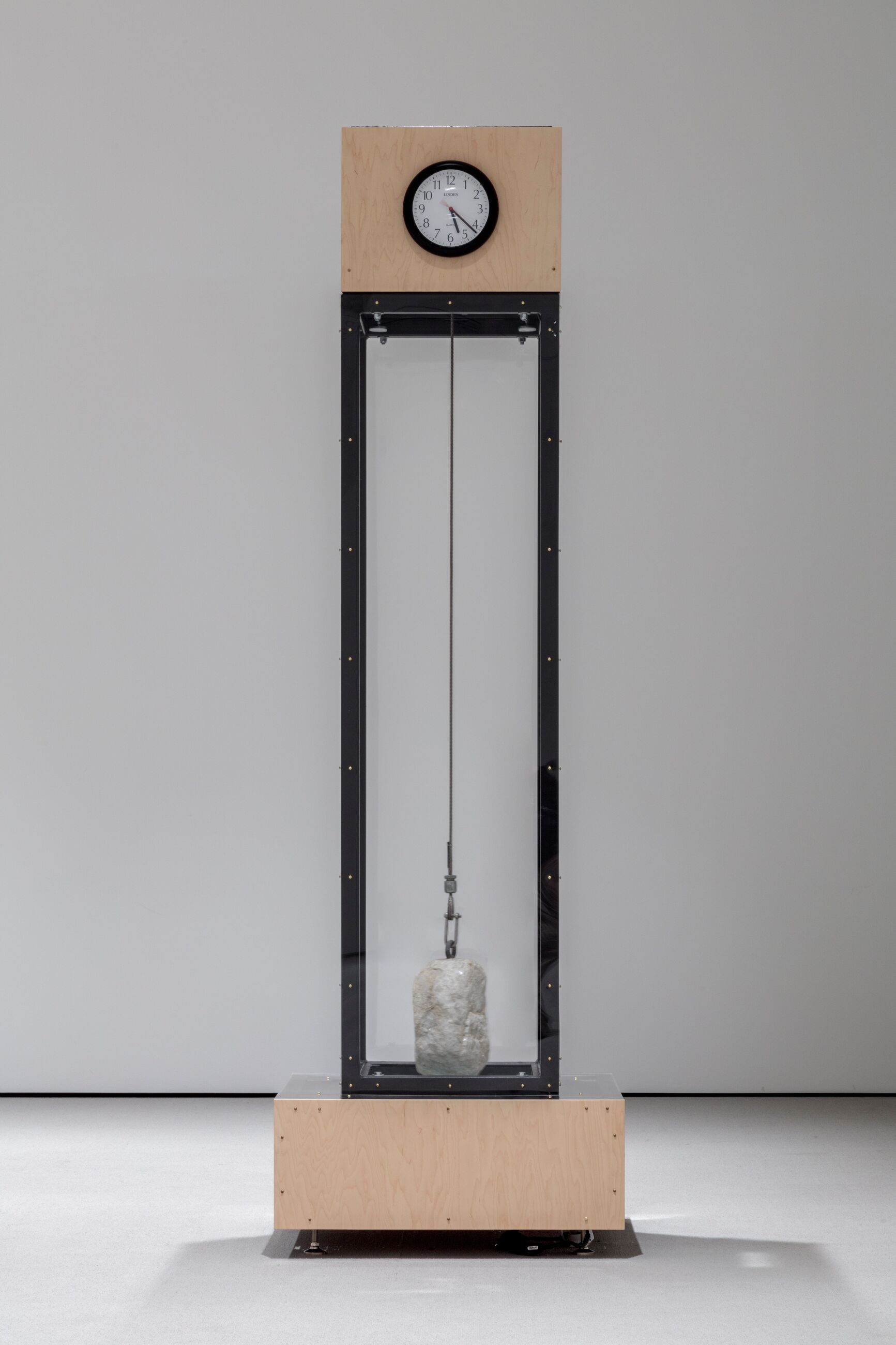Diary
Another Consciousness
Cliodhna Murphy on the urgency of change

Charles Gaines, Falling Rock, 2000-23. Installation view of “Lifes,” Hammer Museum, Los Angeles, 2022. Photo: Joshua White
As we enter the twenty-sixth year of the 21st century, the climate crisis has become such a part of everyday life that alarm by one standard appears mundane by another. In his 2009 essay “The Politics of Sustainability: Contemporary Art and Ecology,” T.J. Demos reminds us that when confronting questions of sustainability, we must continually ask ourselves exactly what sustainability means, whose interests it promotes and whose interests it leaves out. This special section of Ursula explores issues related to sustainability through the perspectives of artists, designers, curators and activists, to whom our fundamental challenge was: What new stories need to be told now? In what ways can new lines of inquiry emanating from the art world have an impact both within it and beyond it?
Emerging from the pandemic in 2021, Hauser & Wirth felt an imperative to act in global sustainability initiatives proportional to the gallery’s impact. Community and collaboration have been central in these efforts, with an internal goal of reducing our carbon emissions by a minimum of fifty percent in the next five years. Although one gallery can’t shift the landscape of an industry, our hope is that by engaging in and encouraging collective commitment, we will make a difference and will help amplify the efforts of others.
With these issues in mind, it’s fitting that the curator Kate Fowle, for the section’s central feature, organized a conversation with the artist Charles Gaines based on a presentation Gaines first gave at Hauser & Wirth’s sustainability conference in 2023, titled “How Does Art Engage the Politics of Climate Change?” Gaines, whose work has been inextricably involved with sustainability for many years now, approached the presentation essentially as a manifesto, asking us to understand climate change as a political critique of culture that, like other critical frameworks—racism, feminism, postcolonialism—possesses the ability to fundamentally alter the contours of art’s domain.
Elsewhere in the section, Fowle invited ecologist Steve Maldonado Silvestrini to write about the singular work of artist Daniel Lind-Ramos within Puerto Rico’s mangrove communities. Along with our friends at the Parsons School of Design’s Healthy Materials Lab, we developed a visualization of innovative building materials that hold the possibility of radically retooling the built world for climate progress. And I had the pleasure of speaking with the Los Angeles-based hacktivist John Threat and the Caribbean writer and organizer Andrew Sage about the growing solarpunk movement, which is both an ideology for living and an ethic for harnessing hope to engender a better future.
As we prepared this section over the past year, it seemed almost inevitable that real-world climate shocks would weigh on its contents. This fear was realized in January when fires overwhelmed Los Angeles, claiming lives and devastating vast sections of neighborhoods, including those of several of our artists, colleagues and friends. The writer and artist Ross Simonini, an Ursula contributor, lost his home and all of his artworks in the fires near the city of Altadena. While displaced with his family in a series of hotel rooms this past winter, he wrote a deeply personal essay for us that serves as a sobering epilogue to the section. Our grief and hope remain with Los Angeles and with its arts community.
—Cliodhna Murphy, Global Head of Environmental Sustainability, Hauser & Wirth
–
Cliodhna Murphy is Hauser & Wirth’s global head of environmental sustainability and is instrumental in developing and implementing the gallery’s climate action plan. She is also part of MOCA’s Environmental Council for Los Angeles and an adviser for the eco-arts organization Murmur. As well, she supports the Gallery Climate Coalition on a range of initiatives.
–
Ursula Issue 13 includes a special section about the environment, as considered by a diverse group of artists, writers and activists. The section takes readers to Puerto Rico, where Daniel Lind-Ramos’s work is rooted in the Caribbean mangrove ecosystem and the dangers threatening it; to Los Angeles, where Charles Gaines has long fused conceptual sculpture and information conveying the speed at which environmental damage is occurring; around the world to see the imagery of the international movement known as Solarpunk, which promotes the power of hopeful imagination in the face of increasing climate threats; and to New York’s Healthy Materials Lab, a design research lab at Parsons School of Design radically retooling the spaces in which we live and work. The section ends with a moving essay by the artist Ross Simonini, a longtime resident of Altadena, Calif., who lost his home and his neighborhood in the recent Los Angeles wildfires.
